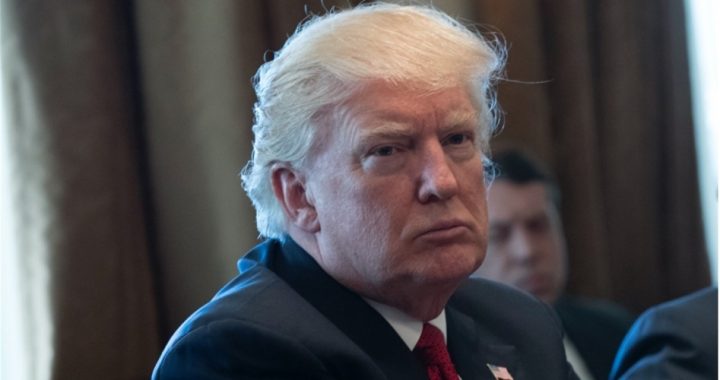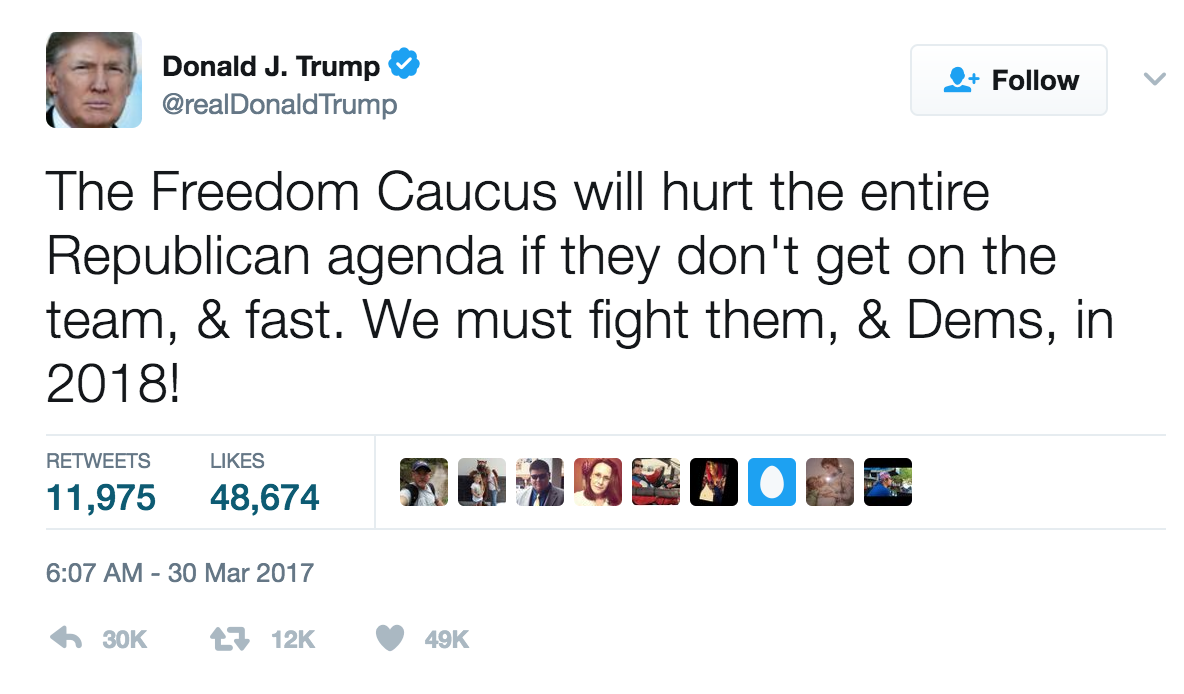
“Our view is: There’s nothing as clarifying as the smell of Air Force One jet fuel. So if he [Trump] needs to bring in the plane and do a rally, he’s going to think about doing that,” said an unnamed official inside the Trump White House in reaction to the refusal of the House Freedom Caucus members to support President Trump’s bill “repealing” ObamaCare.
The official was responding to press queries after Trump himself lashed out at the Republican group of conservative members of the House of Representatives in an early Thursday morning Tweet: “The Freedom Caucus will hurt the entire Republican agenda if they don’t get on the team, & fast. We must fight them, & Dems, in 2018!”
The Freedom Caucus, made up of the most conservative members of the House, refused to support the bill pushed by Trump and Speaker of the House Paul Ryan (R-Wis.) because they viewed it as making only marginal changes to ObamaCare — at best. As Senator Mike Lee (R-Utah), one of the more conservative members of the Senate, said, “This is exactly the type of back-room dealing and rushed process that we criticized Democrats for and it is not what we promised the American people.”

Dubbed the American Health Care Act (AHCA), the Trump-Ryan alternative to ObamaCare left in place some of the worst features of ObamaCare. For instance, it maintained the “community rating” provision of that law, which requires insurers to accept all applicants and then charge them the same rates, regardless of any pre-existing conditions. The Republican bill even kept the onerous “Cadillac tax” on generous health insurance plans sponsored by employers.
Trump, who prides himself on his ability to cut a deal, has found that dealing with the various factions in Congress is not as simple as one of his many construction projects. He personally contacted 120 members of the House, but it was not enough.
Avik Roy, writing in Forbes, said that the blame for the bill’s defeat should not be placed upon the Freedom Caucus or even other Republican members of the House, but rather on its leadership. Roy noted that Ryan and his lieutenants “failed to build an intra-Republican consensus on how to replace ObamaCare…. Instead, they simply assumed that they had developed the most plausible path forward, and plowed ahead.”
Roy was also critical of the strict timeline in which the House had only 16 days “to consider a bill that would make major changes to one-sixth of the economy,” and presented the plan to the House under a “my way or the highway approach.”
While some Republicans argue the Freedom Caucus made a political mistake in not passing the bill over to the Senate, contending that body’s more conservative members such as Mike Lee, Rand Paul, and Ted Cruz would make the necessary changes, this hope appears rather unrealistic. As Roy noted, “Senate Majority Leader Mitch McConnell informed his colleagues that once the House passed the bill, the Senate would take it up with a direct floor vote, so as to give senators precious little opportunity to amend the bill or think it further through.” In other words, although Senator Paul had an excellent replacement plan, about all he or any other opposition senator could do was what the Freedom Caucus did: vote against the bill.
Representative Mark Sanford (R-S.C.) said that there is no need to rush a bill through Congress, as Trump and Ryan were attempting to do. He also disagreed with the approach of threatening Republican members who want a better bill.
“The idea of threatening your way to legislative success may not be the wisest of strategies. His message yesterday was that he wanted to work with Democrats; I guess the message today is ‘we need to fight against Freedom Caucus members and Democrats.’ That’s a conflicted message. It’s a case of shooting messengers who were, rightfully, pointing out problems in a bill that the American public has not shown a proclivity toward.” Some polls indicate that the Trump-Ryan bill was supported by only about one in five Americans.
Perhaps the strongest response came from Freedom Caucus member Justin Amash of Michigan, who tweeted that Trump’s support of the bill indicated that he had joined the very Washington establishment he had campaigned against. “It didn’t take long for the swamp to drain @real Donald Trump. No shame, Mr. President. Almost everyone succumbs to the D.C. Establishment.”
A more measured response came from Rep. Jim Jordan (R-Ohio). He insisted that the opposition to the bill was based on actual policy differences, and was not intended as a personal slight against Trump. “The president can say what he wants and that’s fine. But we’re focused on the legislation.”
Some of the more moderate members, such as Chris Collins of New York, of the “moderate” Tuesday Group in the House, thought Trump’s threats against members of the Freedom Caucus were deserved. “He’s obviously frustrated, as many of us are, and there’s only one place where the finger-pointing should go, and that’s to the Freedom Caucus.”
Collins rejected any negotiations with the Freedom Caucus to iron out any differences, stating, “The Tuesday Group will never meet with the Freedom Caucus.” He insisted that the Freedom Caucus needed to accept the bill as Trump and Ryan proposed it.
Grover Norquist, a self-styled “anti-tax” activist, also blamed the Freedom Caucus, not Trump. Norquist claimed, “There was room for give and they (the Freedom Caucus members) wouldn’t give.”
And, if Trump got involved in Republican primaries next year, Norquist predicted that Trump would “get some scalps.”
If Trump did support challenges to Freedom Caucus members in Republican primaries next year, it would be quite unusual, though not unprecedented. Trump has already said, “We’ll destroy his career,” when speaking of a state senator in Texas who opposes civil asset forfeiture (CAF). CAF is a situation in which law enforcement can seize property of persons merely accused of a crime. In many cases, the property is not returned even if the person is found not guilty or not even charged with a crime at all.
But the last president to support primary challenges to members of his own political party in any significant way was President Franklin D. Roosevelt in 1938. Roosevelt attempted to purge the Democratic Party of more conservative Democrats who opposed his New Deal programs. FDR targeted several senators and representatives, but defeated only one of them. The remainder were triumphantly reelected, and it was considered a humiliating defeat for him. The divisive effort even contributed to the Republican Party picking up seats in the House and Senate that fall.
Any effort by Trump to target conservative Republicans, simply because they want a better bill on health care, could cause similar deep divisions within the Republican Party, and perhaps even prompt a primary challenger to Trump himself in 2020.
Representative Steve Stivers (R-Ohio), who chairs the party’s National Republican Congressional Committee (NRCC), and sports a dismal 53 percent cumulative rating on The New American’s “Freedom Index” (which measures members’ votes in adherence to constitutional principles), seemed to side with Trump over his fellow Republican House members. “I want to be very clear: We have a policy of helping out incumbents that pay their dues,” Stivers told a reporter, in reference to the money the committee doles out to incumbents. “As long as they pay their dues, we’re gonna be there for them.” Stivers then added, “If I was them, I’d take a look and see how I’m doing on my dues.”
In other words, this paying of “dues” is to support Trump. (Oddly, supporting the Constitution is evidently of lesser importance to Stivers.) This is the same attitude that led congressional Republicans to follow President George W. Bush in creating new entitlement programs, increasing federal control of education with “No Child Left Behind,” and sending American soldiers into war in Iraq. After six years of such support, the Republican Party lost control of both houses of Congress in 2006, then the White House itself in 2008.
Which is why we now have ObamaCare.



